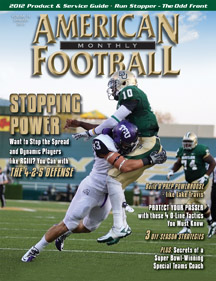Article CategoriesAFM Magazine
|
Coach to Coach – Off-Season Prioritiesby: Bryon HamiltonAssociate Head Coach and Offensive Coordinator, Shasta College © More from this issue “The Future is Now!” was a phrase I heard often during the 1991 football season at Long Beach State. It was one of the many catch phrases that George Allen coined and is famous for. As we enter the heart of the 2012 off-season, it’s sometimes difficult to envision that the future of next football season is now. When it comes to developing a successful plan for the 2012 season, the future is indeed now. Over the past year and half, I have shared many of my ideas as they relate to the primary off-season areas that most coaches and programs attend to. However, there are several less obvious aspects to having a strong and successful program that can also be assessed and fortified in the off-season. These areas may not be as easy to measure, but they are extremely crucial in your success. 1. Facilities However, there are ways to improve the facilities at every school. The goal is to maximize what is possible and to formulate a plan that focuses on your current and future needs. I make it a point to assess our facilities at the end of each season. I start by composing lists of items I would like to have, things that need an upgraded and facilities that our competition has that may give them an edge. Once my list is composed, I rank the items based on need and realistic accessibility. I have found that many companies will allow you to purchase expensive items on zero interest payment plans. This is a great way to purchase expensive items and not deplete all of your funds in a single year. Asking booster clubs or local businesses who are supportive of your program to volunteer labor and donate supplies is a great way to upgrade facilities. By using this formula, we have added 60 pro-style lockers, weight room equipment and state of the art electronics that have helped to keep our facilities competitive and often ahead of our competition. If you think big, start slow and have a plan, you can eventually have excellent facilities that will play a role in achieving success. This may seem limited when compared to other booster clubs, but I believe that by simplifying and specifying their role, a healthy relationship between the school, booster members and coaches can be fostered and maintained. Too many times, I have talked with coaches who tell horror stories of an all-powerful booster club that essentially had the influence to run the entire football program. This can be an unhealthy environment that often leads to friction and division between parents and coaches. Booster clubs are supposed to “boost” the football program, not run it. The off-season is a great time to assess the role of your football booster program. Use the next few months to fortify relationships with members while at the same time clearly defining their role and objectives. It is amazing what can be accomplished when everyone understands their role and all involved with your program are pulling the rope in the same direction. Using the winter months to assess the strengths and weaknesses of your assistant coaches allows you to help them make the necessary improvements that will lead to a more efficient and effective coaching staff in the upcoming season. In prioritizing these areas, I am able to effectively assess my staff and thus make necessary changes, additions and improvements that will allow our program to move forward. I judge the success of our lower levels by using the following criteria: Are we getting the athletes on campus out to play? Are we retaining the majority of the players who play on the frosh team (if we have 50 frosh players, are the junior varsity numbers similar the following season)? Are the core skills necessary for our success being taught and emphasized? Are the teams disciplined, passionate and enthusiastic when they are on the field? If we are doing a good job in these areas, then I know our lower levels are successful regardless of their overall win percentage. The winter months are a great time to define the goals for your lower level teams and encourage and equip the coaches with resources necessary to accomplish them. |
|
| HOME |
MAGAZINE |
SUBSCRIBE | ONLINE COLUMNISTS | COACHING VIDEOS |
Copyright 2025, AmericanFootballMonthly.com
All Rights Reserved




